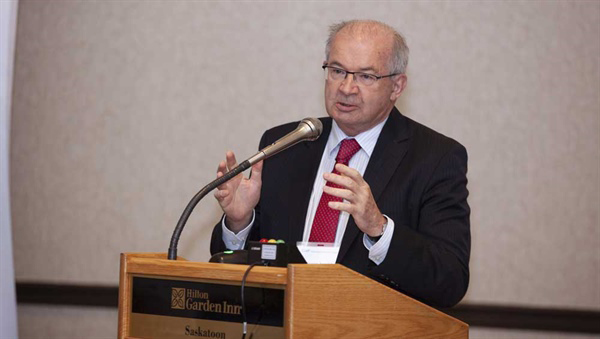Dr. Dennis Kendel is interim Chief Executive Officer of Saskatchewan’s Health Quality Council (HQC), a position he has held since May 2018. He was a member of HQC’s Board of Directors from the organization’s inception in 2002 until 2017. During 2016-2017, Dr. Kendel served on the panel that advised the Government of Saskatchewan on health system restructuring. Dennis has served in a variety of senior roles provincially and nationally over the years, including Registrar (CEO) of the College of Physicians and Surgeons of Saskatchewan (CPSS), CEO of Saskdocs, and President of the Saskatchewan Medical Association, the Federation of Medical Licensing Authorities of Canada, and the Medical Council of Canada.
In this commentary, Dr. Kendel discusses the challenges that restructuring poses to relationships at all levels in Saskatchewan’s health system. He goes on to talk about the evolving role of HQC and points to future areas of focus for the organization.
In the fall of 2016, I was privileged to serve with Brenda Abrametz and Tyler Bragg on the Advisory Panel on Health System Restructuring. All of the Panel’s recommendations were accepted by the Government of Saskatchewan in January 2017. After an 11-month transition planning process, the Saskatchewan Health Authority (SHA) was launched on December 4, 2017.
In May 2018 the Board of Directors of the Health Quality Council (HQC) asked me to serve as interim CEO of the organization.
This sequence of experiences is akin to a screenwriter getting an acting role in a play he co-wrote. It has afforded me a unique opportunity to experience first-hand some of the impacts and implications of the restructuring of our health system.
While the Panel mandate focused on health system structure, the Panel was acutely sensitive to the reality that changing system structure alone would not assure enhanced safety and quality of health services. At best, transition to a single provincial health authority could provide a better foundation for organizing and delivering more integrated health care services.
The Panel also gave thoughtful consideration to the future role of agencies such as the Saskatchewan Cancer Agency, Physician Recruitment Agency of Saskatchewan, eHealth Saskatchewan, 3sHealth, Saskatchewan Association of Health Organizations (SAHO), and the HQC, in the context of a more consolidated system. Given the magnitude of change implicit in integrating 12 RHAs into one entity, the Panel opted not to recommend immediate integration of any of these agencies. It did recognize the potential merits of future integration of some of these agencies into the SHA. However, it explicitly recommended HQC remain an independent agency.
The PRAS has now been integrated into the SHA and integration of SAHO is anticipated within the next year.
In our relationship with each other, we generally refer to the SHA, SCA, eHealth, 3sHealth, SAHO, the HQC and the Ministry of Health (MOH) as “partner agencies.” The concept of organizational partnership assumes shared organizational values and goals, mutually respectful working relationships, and shared decision-making.
Restructuring challenges relationships in Saskatchewan’s health care system

In reality, all organizations are innate legal entities. It is the people who work in organizations who have the capacity to work as effective partners. Effective organizational partnership relies entirely upon highly functional and collaborative working relationships between people at various levels of each organization.
1. Risks to inter-personal working relationships
The inescapable reality of any large-scale organizational restructuring is that it disrupts inter-personal working relationships. We are experiencing some adverse impact of this reality in Saskatchewan at this time. The situation is steadily improving as the SHA progresses in recruiting and appointing its directors province-wide. It may take some time till we reach capacity for optimal inter-agency partnership. During this period of relationship disruption, we need to be nimble and creative in finding ways to work together that minimize the risk of harm and optimize safety and quality of care.
2. Risks to relationships between different-sized organizations
Another risk of system consolidation is a possible compromise in the capacity of organizations of vastly different sizes to work effectively together. When health service delivery organizations become massive, they are sometimes inclined to assume that they are entirely self-reliant and allow valuable relationships with smaller support organizations to wither. We need to be mindful of that risk and mitigate it in Saskatchewan.
3. Risks to relationships with Health Ministries
The experience with the consolidation of health service delivery systems in other provinces also suggests that this restructuring causes some strain in working relationships with Health Ministries. Governmental ministries in all sectors tend to be very tradition-bound, which impairs their ability to adapt and change. We have seen some of this strain in Saskatchewan. Hopefully, the recently implemented restructuring in our provincial Ministry of Health will alleviate some of this tension.
4. Risks to relationships with patients, families
My greatest concern is about the adverse impact of the restructuring process on our working relationships with patients and families. Most of the former RHAs had fairly mature working relationships with local patients and family advisers. These relationships are at risk of eroding if we do not soon implement effective pan-provincial strategies for collaborating with patients and families as true partners.
HQC evolving to improve health, not just health care
The HQC Board has endorsed a plan that anticipates the HQC positively influencing the health of all citizens of this province as opposed to just optimizing health care services. Making this vision a reality will require us to build capacity for partnerships with citizens and communities. It will require us to build and sustain inter-sectoral relationships. Because of the unacceptable gap between the health status of First Nations and Métis peoples and the rest of the population, we will strive to develop effective working relationships with First Nations and Métis leaders.
Providing timely, actionable feedback to system through analytics
The HQC also anticipates playing a leading analytical role with the goal of providing timely and helpful performance feedback to our health care system. We envision doing this work in a collaborative relationship with all of the system partners while remaining mindful and attentive to the fact that the HQC was deliberately established to function with some independence from the health service delivery system.
Informing planning with predictive modelling
During the life of the Emergency Department Waits and Patient Flow Initiative housed at the HQC, we demonstrated the capacity of our staff to do predictive modelling through the use of advanced analytics. We see merit in enhancing our advanced analytic capacity to optimally inform future planning of health care services across Saskatchewan.
We need to embrace new ways of working
In my role as the interim CEO of HQC, I see a very exciting future for this organization as a key partner among all of the agencies committed to optimizing the quality of health care and population health in Saskatchewan. Meeting the exciting new challenges and opportunities that lay ahead of us will require us to embrace new ways of working.

Meeting these new challenges and opportunities will require strong adaptive capacity. The highly skilled HQC team has previously proven its capacity to adapt to evolving system needs. I am confident that this amazing team of committed change agents will continue to meet every new challenge that arises.
I expect to soon conclude my service as HQC’s interim CEO. It has been a highly motivating and energizing experience to work with the HQC team over the past seven months. I know that my successor will most certainly enjoy the opportunity to work with this high-performing team at the HQC.



